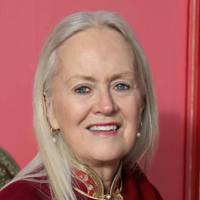![]()
The following is an excerpt from the book Wisdom Rising: A Journey into the Mandala of the Empowered Feminine written by Lama Tsultrim Allione.
*Editor’s Note: Here at elephant, we’re notorious bookworms—we love them, and want you to love them, too. But, recently, we found out books are evil—one of the worst things for the environment. Before you buy your next book, read this and this. Keep reading, but read responsibly.
The story of Grandmother Bertha Grove.
When my husband Dave and I moved to the land in southwest Colorado that would become Tara Mandala in the spring of 1994, I felt we needed to make contact with the original inhabitants of the land and ask for their support and help.
Synchronistically, earlier that spring at a gathering in Texas, before we moved to Colorado, I sat next to Grandmother Bertha Grove, a respected elder in the Ute tribe who would be our closest neighbors in Colorado. She was in her seventies at the time: a diminutive woman with gray hair, high cheekbones, and thick glasses. It was always hard to tell where she was looking. During the gathering, we talked a little and exchanged addresses.
When we arrived in Colorado, I immediately contacted her and then visited her small white house in Ignacio, about a half-hour drive through rolling hills, meadows, and majestic rock formations. Behind her house, I could see the round dome of a sweat lodge.
She welcomed me at the door and I entered her living room, which was clean and open, with Native American blankets on two couches. We passed through the living room into the kitchen, which was painted white, with a white gas stove and refrigerator. There were herbs in neatly labeled jars on the shelves. She offered me water to drink and we sat at her kitchen table. I made my request right away.
”Grandmother, we just moved onto seven hundred acres of land east of here with the intention of creating a retreat center. Will you come and help us build a sweat lodge and do ceremonies to ask for guidance on how to enter the land in a good way?”
She agreed.
She and her husband Vincent came a few weeks later, driving a small brown camper in which they stayed. At the time, we had no buildings and everyone was camping. We built our lodge in a small, flat meadow near our outdoor kitchen, which was located under a large box elder tree.
The sweat lodge, or stone people’s lodge, is a dome-shaped structure made of red willow branches that are bent into a kind of upside-down basket; in front of the door, which faces east, is the fire where the stones are heated. As the lodge was constructed, it was covered with blankets and tarps until it was sealed.
Upon completion of our lodge, we entered the darkness to begin the ceremony; there, the fire keeper delivered the red-hot rocks into a pit in the center. The entry flap was lowered, and the prayers began as the heat increased from the steam when water was poured onto the rocks. Vincent was the water pourer and led the songs in the Ute language—songs of purification, healing, and rejuvenation.
During the ceremony, we were invited to make prayers out loud that could be for specific reasons or for specific people. I prayed for guidance from the spirits of the Tara Mandala land.
I also studied herbal medicine with Grandmother Bertha.
One day, when we were out collecting herbs in the upper meadow, she said, “When you want to take any herb, first ask permission, and then pull out a hair from your head and leave it as an offering. There always has to be an exchange with Mother Earth. That little pain you feel in your head when you pull out a hair, the earth also feels when you take a plant, and this is a good reminder.”
Then she moved over to a small plant with yellow flowers and said, “See this yellow gumweed? It’s for lungs and is good for coughs—squeeze the yellow flower at the base and you can feel the stickiness.” She picked one and held it up for me to feel. “That’s healing medicine in the plant. But when you pick it, never take the strongest plant, because the strongest one will bring back a more powerful next generation. If you take the medium-size ones, they still have power, and you’re not depleting the whole group.”
In this small exchange, I learned so much about how to have right relationship to plants and to all our resources.
Grandma Bertha always referred to the earth as Mother Earth, saying, “We should honor Her.” Whether it’s with our own mothers, the Mother Earth, or anyone or anything else, we are always in an interdependent relationship with everything.
We, both men and women, need to work toward a united and creative partnership between genders and Mother Earth an integration of spirit and matter.
We must learn to leave something when we take something. We must learn to leave the best and the strongest, so it is present for future generations, and not to take the best for ourselves.
As Chief Crazy Horse said, “Treat the earth well: it was not given to you by your parents, it was loaned to you by your children. We do not inherit the earth from our ancestors, we borrow it from our children.”
~






Read 0 comments and reply